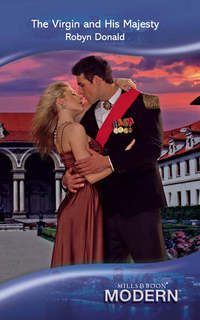
Полная версия
A Forbidden Desire
Jacinta had no illusions about her looks; she knew that her height and thinness and the clearly defined, high-bridged nose that dominated her face were not redeemed by thick, violently ginger hair, or green eyes hazed with gold and set beneath straight, dark copper brows. Accustomed to feeling out of place amongst the chic women she saw everywhere, she was nevertheless outraged that Paul McAlpine should make her feel the same.
‘Yes?’ she said, aware that she sounded curt but unable to alter the tone to her usual confidence.
‘I have several spare bedrooms,’ Paul McAlpine told her. ‘You’re more than welcome to use one. My housekeeper lives in a flat at the back, so you won’t be alone in the house with me.’
No sarcasm sharpened that beautiful voice, nothing even obliquely hostile glimmered in those blue eyes, but the skin pulled tight on the nape of Jacinta’s neck as a shiver of cold foreboding slithered the length of her spine.
‘That’s very kind of you,’ she said warily, ‘but I don’t think—’
He smiled. It was a smile that had probably stunned more women than she’d had showers. Silenced by its impact, she had to swallow when her words dried on her tongue.
Calmly, almost blandly, he said, ‘If you feel awkward about living here with me I’ll stay in a flat I own in Auckland.’
‘I can’t drive you out of your house,’ she said, feeling both irritated and awkward.
His dark brows inched inwards. ‘I believe that you had to move out of your flat, and as Gerard’s sold his apartment you can’t go there. I spend quite a lot of time either travelling or in my flat in Auckland; a few extra nights there won’t be much of a hardship.’
What would it be like to own several houses?
After one swift, circumspect glance Jacinta realised she didn’t have a chance of changing his mind. Thoughts churned around her mind, to be promptly discarded. She didn’t have enough money to stay in a motel or rent another flat; the main advantage of Paul McAlpine’s bach had been that it was free of charge.
He watched her with eyes half hidden by his lashes, waiting with a sort of vigilant patience—the remorseless tenacity of a hunter—that intimidated her in a way she didn’t understand.
For heaven’s sake! She was letting the aftermath of one dance ten months ago scramble her brain entirely.
With enormous reluctance she finally said, ‘Then—thank you. I’ll try not to get in your way.’
‘Gerard said you’re starting on your thesis.’
‘Did he?’ she said non-committally. ‘What about Christmas?’ she asked. ‘Will the penguins be out from under the bach by then?’
‘It’s unlikely.’ An enquiring eyebrow lifted. ‘Were you planning to stay in the bach over Christmas?’
This would be her first Christmas alone. Through the lump in her throat she said raggedly, ‘Yes. My mother died only a week after we came back from Fiji.’
‘I’m sorry,’ he said quietly. ‘That was hard for you.’
Looking away, she nodded, swallowed and went on, ‘I never had the chance to thank you for your kindness to her in Fiji. You left the day before us, and I—’
‘I wasn’t kind,’ he interrupted. ‘I liked her very much, and admired her gallantry.’
‘She liked you, too.’ Jacinta paused to steady her wobbly voice. ‘She really enjoyed talking to you. It made her holiday. She was so determined I shouldn’t miss anything...’
Cynthia Lyttelton had insisted Jacinta use the facilities at the resort, pleading with her to swim, to sail, to go snorkelling. ‘Then you can tell me all about it,’ she’d said.
Because the resort staff had been kind and attentive to her mother, Jacinta had given in. When she’d returned, salt-slicked and excited, after her first snorkelling expedition, Cynthia had told her about this man who had joined her beneath her sun-umbrella—handsome as Adonis, she’d said, and funny, with a good, sharp brain.
Gently, he said now, ‘She told me she didn’t have long to live. I gather she’d been ill for a long time, yet she was completely without self-pity.’
‘She had arthritis, but she died of cancer.’ I will not cry, she averred silently, clenching her jaw against the onset of gnef.
‘I’m so sorry,’ he repeated, and she knew he was.
So many people—considerate, well-meaning people—had told her that her mother’s death must have been a blessed relief to them both She’d understood that they were giving her what sympathy they could, but although often in great pain Cynthia had enjoyed life, and she hadn’t wanted to die.
And Jacinta still mourned her loss.
She nodded, and they sat without speaking for some moments while she regained control of her emotions.
Eventually she looked up, to meet a gaze that rested on her face with unsettling penetration. Instantly his lashes covered his eyes, and when they swept up again there was nothing but that vivid, unrevealing intensity of colour, hiding all emotion, all speculation. His sculptured mouth had thinned to a straight, forceful line.
A firebrand plummeted to the pit of her stomach. Instinct, so deeply buried in her unconscious she’d never known of its existence, stirred, flexed, and muttered a warning.
What am I getting into? she thought.
Common sense, brisk and practical, told her she wasn’t getting into anything, because she wouldn’t allow herself to. Paul McAlpine might look like every woman’s idea of a dream hero, with his golden hair and athlete’s body and disturbing mouth, but she didn’t have to worship at his shrine if she didn’t want to.
‘I usually have a quiet Christmas,’ he told her. ‘Anyway, it’s almost two months before we have to think of that. Our tea’s probably ready, but if you’d like to come with me now I’ll show you where the bedrooms are and you can choose one.’
Stiffly she got to her feet and went with him in and out of five superbly furnished bedrooms, all with both double-hung and French windows leading onto the encircling verandah. Just like something from a glossy magazine.
Jacinta refused to be impressed. In the end she chose one with a view of the sea solely because it had a long, businesslike desk on one wall.
‘This one doesn’t have its own bathroom,’ Paul told her, ‘but there’s one right next door.’
‘It’ll be super, thank you.’ Outside, the verandah had been furnished with a lounger and several chairs. Below the wooden balustrade flowers frothed and rioted. The room was pleasantly cool, with a daybed in one corner and an elegant Victorian dressing table, less ornamented than most of its kind. ‘It looks lovely,’ Jacinta finished sincerely. ‘Thank you.’
‘It’s nothing.’
The negligent disclaimer was delivered in a deep voice, its obscurely equivocal intonation setting her teeth on edge.
She was being paranoid.
Well, it was probably normal. Although earlier that year she’d endured an unpleasant experience with a man, eventually her suspicions regarding masculine intentions must fade. Unfortunately it wasn’t going to be a speedy process. Even with Gerard, who couldn’t have been nicer, she’d found herself searching for sinister motives.
And now she was doing it again. Possibly because Paul McAlpine was so—so—well, so gorgeous. Her nervousness didn’t mean she sensed anything ulterior; it arose from her physical awareness of him, which was her problem, not his. Behind Paul McAlpine’s air of calm, confident good humour was simply that—calm, confident good humour.
Any ordinary woman would be jittery and a bit overwhelmed when confronted by one of the favoured few, a golden man with everything, including a presence that automatically made him a man to be noticed.
Exhausted, and therefore easily influenced, she simply needed time and peace to catch up with herself again. And here, in this beautiful, peaceful place, she’d get them.
Especially if her host was going to be away a lot.
They were halfway down the hall on the way to the kitchen when he said, ‘Gerard tells me he’s doing research for another book. I thought he’d just finished one.’
‘Yes, but he found out that an old rival of his is intending to move in on his territory so he thought he’d better get going on this one and pre-empt him. Even in the academic world things can get rough when it comes to ego and staking claims.’
‘I see. Is he planning to spend all his leave in the archives?’
‘I think so. It was organised in such a rush that I’m not too sure of his plans.’
One eyebrow arched in a manner that showed only too clearly what Paul McAlpine thought of that, but he said nothing more. As she accompanied him Jacinta thought acidly that it was impossible to imagine this man ever doing anything on impulse.
In the spacious, very modern kitchen he introduced her to his housekeeper, a large-boned, blue-jeaned woman in her late thirties called Fran Borthwick, who smiled at her and said, ‘Welcome to Waitapu. The tea’s ready. Where do you want it?’
‘I’ll take it into the conservatory,’ Paul said serenely, lifting the tray.
Jacinta returned the housekeeper’s smile and went with him.
The conservatory, a delicious Victorian folly, was equipped with rattan furniture upholstered in muted stripes. Jungly tropical growth sprouted from splendid pots; in one a huge frangipani held up white and gold flowers, their sweet scent reminding Jacinta forcibly of the week she’d spent in Fiji.
‘Would you like to pour?’ Paul McAlpine invited, setting the tray on a table.
Jacinta’s gaze lingered too long on his elegant, long-fingered hands—hands that promised great strength as well as sureness. Resenting the mindless response that shivered across her nerve-ends, she said, ‘Yes, of course,’ sat down and lifted the teapot.
He liked his tea without milk and unsugared. Spartan tastes, Jacinta thought as she poured, then set down his cup and saucer.
It was an oddly intimate little rite, one that seemed right for the old-fashioned house and teaset. Ruthlessly ignoring the niggling edge of tension that sawed at her composure, she drank her tea and made polite conversation, wondering as she listened to his even, regulated voice whether authority and imperturbable good humour was all there was to Paul McAlpine.
No, he wouldn’t have reached the top of his profession without intelligence and, she suspected, ruthlessness.
No doubt with women, too. The lover Gerard had pointed out that day in Ponsonby was a woman so beautiful she’d dazzled. However she was not the woman who had been with Paul in Fiji.
Perhaps he was promiscuous. Was that what Gerard had been hinting at with his reference to broken hearts?
Her quick revulsion at the idea was a warning, as was her conviction that he was too fastidious for crude promiscuity. All she knew about him was that he’d been kind to her mother, he’d been jilted—and he’d had two lovers in ten months.
And he danced well.
When his cool voice broke into her memories she jumped guiltily, and had to pull herself together to answer his question about her degree.
‘I majored in history,’ she said.
‘Yes, of course. Gerard’s speciality. That’s where you met him, I suppose?’
It was impossible to accuse him of prying. He must, she thought—surely irrelevantly—be hell in a courtroom. Any witness would be lulled into a sense of security by that lazy, calm voice that expressed nothing more than interest.
But he must have heard the reservation in her voice when she replied, ‘I—yes.’
Dark lashes almost hid his eyes. ‘I believe he offered you bed and board in his apartment. That must have been very convenient.’
Tautly she responded, ‘He realised that things were—difficult—where I was living, and very kindly told me about a flat a friend of his wanted looked after while she took up a scholarship in England.’
For a moment the classically shaped mouth straightened, but when she looked again it was relaxed, even curved in a slight smile. ‘Flatmates can be trying, can’t they.’
It was not a question. Trying to lift the flatness of her tone, she agreed, ‘Oh, they certainly can.’
‘It sounds as though you had the ones from hell’
‘He—one was not—not congenial.’ She put her cup and saucer down, relieved when they arrived on the table without any betraying chinks.
Paul said nothing, and after an awkward moment she went on, ‘Gerard found me in the university library one night and realised that I was having a bad time.’
‘Ah,’ Paul said smoothly, ‘he’s always found it difficult to cope with tears.’
She fastened down her indignation. ‘I wasn’t crying,’ she told him firmly, and added, ‘He’s very kind.’
‘I’m sure he is,’ Paul said, his voice soothing, almost mesmeric. ‘Why can’t you stay in your flat over the holidays?’
‘A friend of the woman who owns it has moved in.’
When Gerard came back in February he’d go into his new house, a house with a flat joined to it, and she’d have a home once more. There was no reason she shouldn’t tell Paul McAlpine that, but she fenced the words behind her teeth.
‘And now you’re waiting for the results of your final exams. Getting your BA has been a long haul. I believe there was a gap between the first two years and the last?’
Had her mother told him that her arthritis had become so bad after her daughter’s second year at university that Jacinta had to give up her studies and come home to take care of her? No, she’d been a very private woman, so it had to have been Gerard. Hoping he hadn’t coaxed Paul to lend her the bach by implying that she was a deserving case, she said evenly, ‘Yes, nine years.’
‘What do you intend to do when you’ve done your Master’s? Teach?’
She shook her head. ‘I don’t think I’d be very good at that.’
Judicially, he observed, ‘I shouldn’t think there’s much call for history masters outside the halls of academe.’
Why was she so—so nervous about her plans, so secretive? Because she didn’t yet know whether they were possible—and because she didn’t like the prospect of appearing a fool. ‘Probably not,’ she agreed, feeling ineffectual and foolish.
Goaded by his measuring look, she added, ‘Actually, the Master’s degree is a promise I made to my mother.’
There, that would show him she wasn’t just drifting.
‘And you always keep your promises?’
‘Yes.’
Without haste her unwilling host surveyed her face, his vivid blue gaze roaming the thick, now untidy mass of her hair, its damp curls clinging to the margins of her high forehead.
Heat burned through her skin. Straight copper brows drawn over her long nose, she met his scrutiny with defiance, knowing that the golden specks in her eyes would be glittering against the green matrix.
Starry Eyes, her mother used to call her when she was a child.
She could read nothing in Paul’s scrutiny beyond a cool assessment that prickled her skin and tightened her muscles in a primitive reflex, but when his glance moved to her wide, soft mouth she jutted her chin, fighting back a response in which anger and a forbidden excitement warred.
She didn’t want this overwhelming physical attraction. It was something she’d never experienced before, and it was dangerous.
Paul’s enigmatic gaze didn’t drop any further—and that, she thought angrily, was just as well. Although his scrutiny was too impersonal to be a leer, he’d checked her out beyond the bounds of politeness.
‘“Mine honour is my life”,’ he quoted.
Shakespeare, of course. An equivocal note in his voice scratched at her nerves again. ‘Something like that,’ she said curtly:
Each word dropped into the tense silence that stretched between them—humming, she thought edgily, with unspoken thoughts, with emotions she didn’t intend to examine.
Just when she thought she was going to have to break it, he drawled, ‘Very worthy.’
‘Hardly.’ She wondered why his words should sound like a warning. ‘Every child learns the importance of keeping promises.’
‘But children often forget as they grow older.’
Too late Jacinta remembered Aura, who had broken her vows to him in the most dramatic way. She opened her mouth to say something—anything—then closed it again when a covert glance at his shuttered expression warned her that nothing she could say would help ease the tension.
He asked her about the new fee structure at the university, and while they discussed the implications Jacinta forgot her reservations, forgot that almost insolent survey of her face. His astute, acerbic sagacity made her think hard and fast, and his understanding of people’s motives startled her with its blend of tolerance and cynicism.
‘Gerard seems to think you’ll get honours when you do your MA,’ he said, the blue eyes indolent behind his lashes.
Some obscure note in his voice made the comment ambiguous. ‘He’s a bit prejudiced,’ she said stiffly. She might be Paul’s guest, but she didn’t owe him any more revelations.
‘We’re always inclined to be prejudiced about the people we’re fond of,’ Paul McAlpine said.
She looked sharply up, but those eyes, so transparent she could drown in them, hid his thoughts very effectively.
‘Or those people we’ve taught,’ she returned, just as pleasantly. ‘I’ll unpack now. Shall I take the tray through to the kitchen?’
‘I will;’ he said, getting to his feet and lifting the tray.
Although Jacinta always noticed hands, it was uncanny that the sight of his sent a tiny shudder of sensation chasing down her spine. Walking back along the hall, she felt an odd weight in her breasts, a kind of tingling fullness that embarrassed and irritated her.
Oh, be sensible, she told herself with self-derisory crispness, trying to be blase and objective. It was hardly surprising that she should be attracted to him. He was magnificent—a splendid figure of a man. There was something about him that made her think of sanity and freedom and enviable, disciplined self-assurance.
Paul McAlpine would probably never find himself in a situation he couldn’t control.
Lucky man, she decided crossly, blinking as she stepped from the shaded verandah into the bright light of the sun.
CHAPTER TWO
EVERYTHING Jacinta owned except for some stored furniture was contained in two suitcases. In the back seat of Gerard’s car, neatly strapped in by the seatbelts, were a computer and printer, and on the floor several boxes of books.
Not a lot for almost thirty years, she thought wryly as she began to ease a suitcase out of the boot.
‘I’ll take that,’ Paul said from behind.
Jacinta didn’t quite stop herself from flinching, but hoped that her swift step away hid her involuntary reaction. ‘Oh—thanks,’ she said vaguely.
The sun gleamed on his fair hair, gilded his tanned skin. When he picked up the second case in one steady lift, muscles flexed smoothly beneath the fine cotton of his shirt. Oddly breathless, Jacinta reached into the back seat, fumbling with the seatbelt that held the computer in place.
A seagull laughed mockingly, its wings catching the light so that it shone silver, a mythical bow in the sparkling sky. Jacinta hauled the computer out and set off with it after the man who walked so easily up the white path and into the cool shadow of the house.
He put the suitcases onto the floor of the room she’d chosen and said, ‘I’ll bring in the printer.’
‘It’s all right,’ she said. ‘I can do it; you must have work to do.’
‘Not today,’ he said gravely.
Frankly helpless, she stood in the centre of the room with the computer in her arms and watched him go. Oh, lord, she thought dismally, walking across to the desk. Biting her lip, she turned and settled the computer into place on the desk.
He looked like a white knight, handsome and easygoing, a golden man—if you could ignore that strong jaw and the hint of hardness in his chiselled mouth. But from behind he looked like a Viking, walking with steady, long-legged, distance-eating strides across a world that trembled before him.
And although imagination was a prime requisite for her next venture, at that moment she wished she didn’t possess quite so much of it.
He brought the printer in, and watched while she set it up. She did that because there was no way she’d open her suitcases in front of him. As it was, she was beginning to think that agreeing to stay here had not been a good decision.
While the test pattern ran through she said tentatively, ‘I think we should discuss some sort of—of arrangement while I’m here.’
Those intimidating brows lifted again. He didn’t say anything.
Jacinta imagined rods of steel going from her head to her heels. ‘Money,’ she said succinctly.
Eyes the same colour as a winter sky, cold and clear and piercing, moved from the screen to her face. ‘You are Gerard’s guest,’ he said, his voice as unyielding as his expression. ‘He asked me to make sure that you were all right while you were here. Money doesn’t enter into it.’
She tried again. ‘Nevertheless I’ll pay for my food.’
He shrugged, his unreadable gaze never leaving her face. ‘If it’s that important to you, work out some sort of board payment with Fran,’ he said negligently. ‘As for anything else, just treat this as your home.’
She frowned. ‘I don’t want to intrude.’
‘Oh, you won’t,’ he said quite gently, and smiled.
God! That smile was as uncompromisingly explosive as Semtex. Jacinta had to draw in a deep, shaken breath before she could even think. Fortunately the printer whirred and chirruped, letting her know it was ready for work. Turning, she stared blindly at it, swallowed, and said, ‘Thank you.’
‘That looks very like Gerard’s set-up,’ Paul observed, his voice almost bland.
‘It was,’ she said shortly. ‘When he got a new one he gave me this. They’re obsolete as soon as you buy them, unfortunately. Not worth anything.’ And she stopped because she’d started to babble, to explain, and she’d made a solemn vow that she was never going to do that again. The experience with Mark Stevens had cured her of ever justifying her actions to any man.
No man was ever again going to believe that he had the right to question what she did or what she thought.
Ever!
One brow drifted upwards. ‘Aren’t they? Not even as trade-ins?’ Paul suggested evenly, and went out across the verandah into the sunlight.
Jacinta glowered after him. Did he think she was sponging off Gerard? Well, she didn’t care! Not even if he did look like something chivalrous from a medieval tapestry, she thought sardonically, opening the wardrobe door and surveying the cavernous depths.
First of all she’d unpack, and then she’d go for a short walk—no, first she’d go and see the housekeeper and establish some ground rules.
She was almost in the hall when she realised that Paul was on his way back again, this time carrying a cardboard carton.
‘From the weight of this I assume it’s books,’ he said.
Nodding, Jacinta firmly directed her gaze away as he set the box down on the floor. ‘Thank you,’ she said.
‘I’ll get the others.’
She knew how heavy those boxes were; Gerard had helped her carry each one out to the car. Yet the weight didn’t seem to affect Paul at all.
Jacinta looked with respect at his shoulders and said again, ‘Thank you.’
‘It was nothing,’ he said, and left her, to reappear before she’d opened the first carton.
Once all the boxes were inside, he showed her the door to the bathroom and said, ‘Make yourself at home,’ before opening a door that presumably led into his bedroom.
Jacinta stood for a moment staring after him, her stomach gripped by some strong sensation. Hunger, she thought. You didn’t have any lunch.
On the floor of the front passenger seat there should have been another carton, packed full of food. She’d brought everything in her pantry, supplementing it with groceries and perishables in the small town twenty minutes away, the town where she’d also taken out a temporary membership in the local library.
It wasn’t there.









